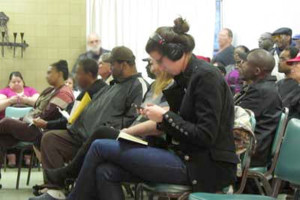Former President of home care workers’ chapter, SEIU, Local 616, editor of “Extracts from Pelican Bay,” former KPFA Labor Collective member.
I, Marilla Argüelles, have developed, provided, and advocated 30 years for services to those facing trauma, deprivation, and stigma. I welcome the idea of serving KPFA because it’s given me my best teachers and allies. Everyday its programming helps me as an artist and teacher to battle bureaucratic obtuseness and lack of funds with creativity and Socratic obstinacy.
• I am well aware of the frustration, waste and expense that accompany litigious solutions. In 1983 Barbara Lubin and I co-founded Project PLAE, Play and Learning in Adapted Environment, the East Bay’s first physically integrated, children’s recreation program. It became a model for programs ranging from Palestine to Siberia. During the three years that Berkeley Unified School District sued our family for insisting on a language-based, local education for our son, every Berkeley Special Education student under 12 was referred to its summer sessions. (Our son became the first wheelchair user to attend Berkeley High School.)
• In 1984 I founded Consensus, California’s first nonprofit head injury program to receive Adult Ed funding. As Community Colleges became more inclusive, our focus morphed into media education projects at underachieving high schools. These differed radically from other digital storytelling programs because it taught students to look for the root causes of social problems, rather than to focus on personal histories of injustice as isolated instances of cruel fate or bad luck.
Students-created Powerpoint presentations on child slavery (BitterSweets: The Dark Side of the Chocolate Trade), criminal injustice, agribusiness, and With or Against Us: The U.S. Patriot Act). They presented these for community service credits to Union meetings, church groups, adult education classes and public library community forums.
• In 1993 a Flashpoints’ interview led me to the California Prison Focus, where Bato Talamantez graciously allowed me to edit letters from the SHU at Pelican Bay into an unauthorized (underground) anthology lauded by Adrienne Rich, Carlos Muñoz, June Jordan, and the BBC.
Since then I’ve spent equal time and heartache serving on Union Contract Negotiations and Executive Boards. As a current member of ULTCW, United For Long Term Care Workers and former president of SEIU 616’s chapter for In-Home Support Service providers, I’m keenly aware of the need for fiscal vigilance, transparency, and resilience. And for the need of unions to work cooperatively with local grassroots efforts on campaigns such as the Fight For $15, MediCare For All, and CoalFreeOakland. KPFA and other Pacifica stations have long supported teachers’ unions, it’s time to empower PTA parents at the local level by hosting events focused on examining the impact of deregulation and international corporate interests on local budgets and cuts.
I pledge to work to replace corporate obsessions of profit, growth, and technology with local democratic economies geared towards Justice and Survival. I’m endorsed by the UnitedforCommunityRadio slate and by Barbara Lubin, Michael Parenti, and Judith Ehrlich.
Official Q. & A.
 exposing the craven manipulation of news by main stream media. I’ve learned far more from Letters and Politics, Project Censored, Guns and Butter, Uprising, HardKnockRadio, and Against The Grain about history, politics, and economics than I did at The University of Chicago despite majoring in history. They’re certainly better at explaining “the causes of religious, philosophical and racial antagonisms” (growing up in Tennessee, always considered immutable and inevitable). I’m indebted to KPFA for Joy De Gruy-Leary, Tim Wise, and others analysts of white privilege, and pleased that a more racially, age-diverse audience now attends the speaker series. Pacifica Archives’/KPFA’s Adopt a School Library day is a brilliant collaboration.
exposing the craven manipulation of news by main stream media. I’ve learned far more from Letters and Politics, Project Censored, Guns and Butter, Uprising, HardKnockRadio, and Against The Grain about history, politics, and economics than I did at The University of Chicago despite majoring in history. They’re certainly better at explaining “the causes of religious, philosophical and racial antagonisms” (growing up in Tennessee, always considered immutable and inevitable). I’m indebted to KPFA for Joy De Gruy-Leary, Tim Wise, and others analysts of white privilege, and pleased that a more racially, age-diverse audience now attends the speaker series. Pacifica Archives’/KPFA’s Adopt a School Library day is a brilliant collaboration.
2. In what ways are the station moving in a negative direction, that you would want to stop or change? What changes would you work for?

Richmond public housing residents at a crowded discussion called by Richmond Alliance’s then Mayor Gayle McLaughlin.
We need a daily half hour early morning labor show with Andres Soto and/or Steve Zeltzer covering issues and actions like The Richmond Alliance. Volunteers could staff KPFA information booths at Farmers’ Markets.
3. What key experience, connections, skills or traits would you bring to the Local Station Board to advance the station’s mission?
4. What ideas do you have for helping the station and the Pacifica Foundation meet the financial challenges currently being faced?







